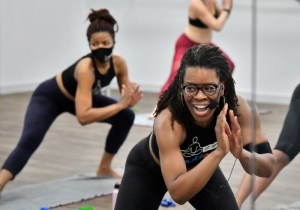
Bikram Yoga Works Founder Kendra Blackett-Dibinga leads a socially distanced, in-person class. (Courtesy Photo)
By Chris Barylick
Special to the AFRO
The COVID-19 pandemic, by anyone’s definition, has been a slog beyond words. Since March of 2020, the world has started and stopped, opened and closed and reopened in fits and spurts, and the mental and anxiety-based toll on the people who’ve lived through it has been enormous.
With that in mind, yoga studios like Bikram Yoga Works & Cryotherapy, located in Riverdale Park, Maryland, the Ivy City neighborhood of Northeast, D.C. and the Mount Vernon area of Baltimore, have leaned into the pandemic and its challenges, functioning as both an online refuge at the height of the pandemic lockdown as well as a hybridized refuge at present, offering both virtual and in-person classes to any who wish to practice yoga. The classes also arrived at a unique point in U.S. history, with a confluence of events, protests and social movements after George Floyd was killed uttering “I can’t breathe,” adding to the stresses of the pandemic.
Bikram Yoga Works & Cryotherapy, began the movement, “I Come to Breathe.’
“That’s what brought me to pick Bikram Yoga Works. I love the idea that it was a multicultural community that was very inclusive and welcoming,” said Melanie Carr, an instructor at Bikram Yoga Works. “And I think definitely within the past year and a half, and the Black Lives Matter movement and what we have done in regards to the ‘I Come to Breathe’ campaign was really to verify the owner, Kendra Blackett-Dibinga. With that movement, ‘I Come to Breathe’ is a statement of showing not only solidarity, but to also allow all community members to come into our space where they could feel safe, and welcomed.”
Carr went on to describe how yoga helped her and those who signed on to practice virtually. “It was still a wonderful connection to be able to see similar faces and meet new faces,” she said. “With the sessions, people could just be appreciative that we had various spaces where we can actually go and be able to relieve ourselves of all the stressors that were happening with the pandemic…If anything, what did happen, especially for our communities that we had grown to become closer and working more intensive with sharing ideas, and, you know, just connecting much better with each other.”
“Currently, we have a hybrid model. We have our in-studio classes available for practitioners to come up and sign up for it. And we also have a virtual platform that was actually birthed out of the need for people to continue to practice so that they’re able to keep their sanity and substance,” said Carr. “Our virtual community is still growing, which is great. I feel like it’s a wonderful alternative for practitioners that still feel a little sketchy of coming into a studio environment. But we’ve done a tremendous job in keeping the studios open, all of our locations, safe, and as completely clean as possible.”

Yoga teacher Sarah Coleman practices an inverted pose. (Courtesy Photo)
For students-turned-yogis such as Sarah Coleman, yoga helped get them through the pandemic. Coleman, who began learning yoga through an ashtanga yoga class in Arlington, Virginia, struggled through the first class, which she wound up enjoying.
“Being present is the only way through because the brain has no time to wander,” said Coleman. “I had no idea what I was doing at first, but by the end of class my disposition was calm and clear. I was a sweaty, cathartic mess and I loved it.”
“Having a home practice through the most limiting portions of the pandemic kept my sanity in check,” explained Coleman. “It’s different when we introspect about improving without the guidance of a teacher. That introspection is an integral part of yoga practice.”
Coleman also noted that even through the worst of the pandemic, when the vast majority of businesses and public spaces were closed, virtual yoga was able to open unexpected new doors for her and others.
“I think being able to take classes with teachers across the globe opened doors for many yogis,” said Coleman. “In my own case, a teacher I like in Virginia was able to provide online sessions with me. Normally I would have to go to her in person.”
Even in the darkest days of the pandemic, yoga practice was still there (even if it was at the other end of a Zoom call and you have had to set up your webcam in an awkward location in your home). The practice was there, and both students and teachers were able to easily connect, work through their movements, and see each other again. Now that hybrid classes are available and students can see their teachers either online or in-person.
With just a quick Google search, it’s easy to figure out how to begin or continue your practice and see some friendly faces whenever you’d like.
Help us Continue to tell OUR Story and join the AFRO family as a member – subscribers are now members! Join here!
The post Yoga Thrives helps practitioners get through the pandemic appeared first on AFRO American Newspapers .











